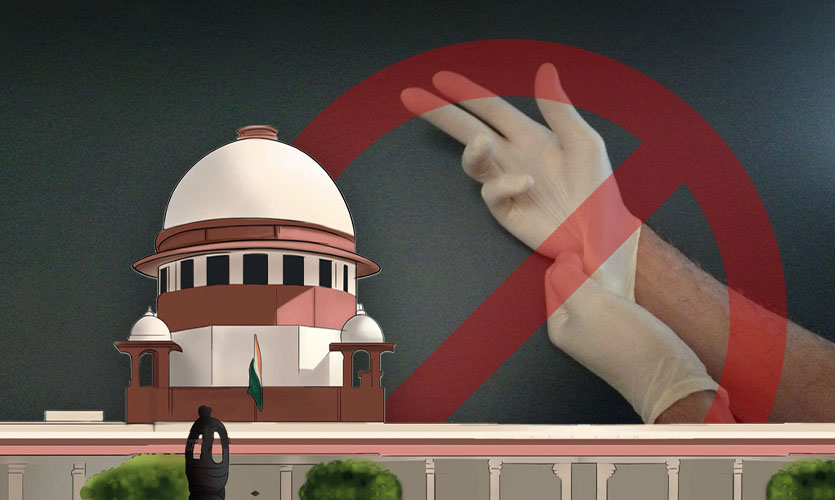The Supreme Court has banned the use of the “two-finger test” in rape cases, which is expected to alter the institutional trend of how rape verdicts in India are understood.
The apex court further declared that anyone administering such a test shall be held accountable for misbehaviour.
A bench of Justice DY Chandrachud, who will become the new Chief Justice of India on November 9, and Justice Hima Kohli restored a conviction in a rape andmurder case, saying that evidence of a victim’s sexual history is not relevant to the case. “It is regrettable that it continues to be conducted even today,” stated Justice Chandrachud.
In addition, the court ordered that two-finger tests be removed from study materials and medical books in medical colleges. Justice Chandrachud noted the trauma experienced by rape survivors who undergo such tests, saying that the invasive and unscientific methods of examining rape survivors traumatise women. A life sentence was imposed on the accused on charges of rape and murder, after the SC overturned the HC’s acquittal order.
This two-finger test method was declared unconstitutional by the top court in 2013, although little was done to deter the practice and it continued.
What Is The Two-Finger Test?
The two-finger test involves putting two fingers into the victim’s vagina to gauge the laxity of her vaginal muscles, which supposedly determines her virginity. An unscientific and regressive practice, this view is based on a patriarchal assumption that a woman who is sexually active is less likely to have been sexually assaulted, even though several judgements and research have declared that one’s sexual history has no bearing on the likelihood of sexual assault. The test is unreliable as a female’s hymen can rupture for a number of causes other than sexual activity, such as participating in sports, cycling, using tampons, or getting a physical exam.
Despite these facts, when the hymen and virginity are the focus of the medical examination, it deflects attention from the actual act of sexual assault. According to Advocate Sudha Ramalingam, as narrated to the News Minute, the connection between rape and sexuality is the root of this exam. She also claims that the test infringes on people’s privacy.
The two-finger test is intended to determine whether the rape victim is “habituated” to sex or not, which is then frequently used to shame or discredit her, according to Dr Indrajit Khandekar, professor in the forensic medicine department at the Mahatma Gandhi Institute of Medical Sciences (MGIMS), Sevagram. He played a key role in getting the ban on the test passed in Maharashtra, in 2011, two years before the Supreme Court order. Dr Khandekar further added that there is no method to assess a person’s level of sex habituality medically.
The professor, who is also a member of the expert group for medical education run by the National Medical Commission, urged that medical textbook curricula be revised to reflect the most recent medical examination guidelines for sexual assault, which do not include virginity tests. The present syllabus has sections on “defining virginity, defloration, legitimacy and its medico-legal importance”, and “discussing the hymen’s medico-legal importance”. The NMC has recommended changes to the forensic medicine course, and instructed students to learn about the dubiousness of the two-finger test in response to Dr Khandekar’s suggestion.
The two-finger test has been repeatedly declared to be unlawful by courts, but as activist and Advocate Ajeetha told the News Minute: “The problem is that medical colleges and hospitals are not given clear instructions to ban these tests.” She says that medical curricula must incorporate these changes and that there is much to unlearn because patriarchal, unscientific practices are deeply embedded and legitimised in books and study materials.
Lack Of Awareness Among Sexual Assault Survivors
In many circumstances, victims are unaware of the revised procedures. In addition to dealing with the trauma of the sexual attack itself, many survivors might not be aware of what to anticipate if they report the crime and are sent for a medical evaluation. Recommendations by the Ministry of Health and Family Welfare (MoHFW) declare that “doctors are legally bound to examine and provide treatment to survivors of sexual violence,” and that permission should be acquired for the purposes of examination, sample collection for clinical and forensic examination, treatment, and police intimation.
The doctors must explain what will happen to the survivors or their guardians (in the event of child survivors) in accordance with the MoHFW guidelines. In order to help with the investigation, capture, and conviction of those responsible for the offence, a medico-legal examination is first conducted. Furthermore, the investigation would be aided by collecting forensic evidence and looking over the victim’s body for any injuries. Obtaining samples of clothing, hair, foreign objects, saliva, pubic hair, and so on may fall under this category.
In the case heard by the SC today, the two-finger test was conducted a decade ago. The bench noted that guidelines on sexual violence had been issued by the Ministry of Health and Family Welfare, and that “these guidelines have proscribed the application of the two-finger test”.
Guidelines were ordered to be circulated to both private and public hospitals. In order to prevent the test from being conducted on rape survivors, workshops should be held for health providers. According to the court, medical schools should revise their curriculum. It instructed the Health Ministry to circulate copies of the judgement to state and local health departments. The home department in each state is also required to inform the respective Director General of Police about the judgement.
“Any person who conducts the two-finger test in sexual assault cases shall be guilty of misconduct,” declared the court.










